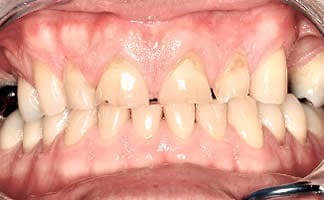Most people grind and clench their teeth from time to time. This process is called Bruxism. The teeth can be damaged and several oral health complications can arise as a result of clenching and bruxism.
In this issue, we will discuss teeth grinding and how it can lead to several oral health complications.
Teeth grinding or Bruxism is usually caused by stress and anxiety. It often occurs during sleep and is more likely associated with a bad bite, missing or crooked teeth. Also, it can be caused by a sleep disorder such as sleep apnea.
In my practice, I often see patients whose front teeth appear very short. Many of them are unaware of the significance of their “short” teeth. Teeth are considered short when the height of a front tooth is shorter than the width of the tooth. Some of these teeth are severely worn or fractured and are wider as they are tall. Also, some teeth are a bit loose, yet some patients are unaware.
Another patient presents with the complaint of constant headaches. They report that they are awaked with a headache that remains during the day and sometimes feel like it is behind their eyes.
Lastly, there is a patient who presents with the complaint of teeth sensitivity that “came from nowhere.” They didn’t have sensitivity as a child or early adulthood, but as they age, their teeth have become more and more sensitive.
What do these four classes of patients have in common? They all suffer from Bruxism.
When you brux, your jaw muscles go into overdrive. The nerves that control the muscles of your jaw continue to fire impulses. Just like if you lift weights constantly for twenty-four hours, your muscle will become sore. The same apply to your jaw muscles. Sore jaw muscles receive the same impulses by the same nerves that causes headaches. This means if your jaw muscles are sore you may also get a headache. If you wake up with a headache, this could mean you were bruxing during the night.
Teeth grinding is harmful to your oral health. In some cases, chronic teeth grinding can result in fracturing, loosening or loss of teeth. The chronic grinding may wear teeth down to stumps. When these events happen; you are forced to introduce the added dental expenses of bridges, crowns, roots canals, implants, partial dentures and in worse cases full dentures.
Not only can severe grinding damage teeth and result in tooth loss, it can also affect your jaws resulting in TMJ (temporomandibular joint) pain and complications.
Bruxism can be managed by a dentist by constructing a mouth guard. A mouth guard is a dental appliance custom fitted for the top part of the teeth. The mouth guard protect your muscles controlling your jaws and protects your teeth from being worn down. Patients usually wear a mouth guard during their sleeping hours.
If stress is causing you to grind your teeth, ask your physician or dentist about options to reduce your stress. Adding stress-management techniques including a consistent exercise program is always beneficial. Seeing a physical therapist or sometimes receiving a prescription for muscle relaxants are among some of the options that are available.
Treating bruxism is a key element in preventing further health complications; including chronic headaches, jaw pain, enamel destruction, fractured dental work, tooth sensitivity, early tooth loss and finally future dental expenses. In fact, treating bruxism can give the quality of life one deserves.
Dr. Kendal V. O. Major is Founder and CEO of Center for Specialized Dentistry which is a comprehensive family dental practice operating in Nassau and Freeport. He is the first Bahamian Specialist in gum diseases and dental implants since 1989. He also is a certified Fast braces provider. His practice is located at 89 Collins Avenue, Nassau at (242)325-5165 or [email protected]

Maxillary Bite Guard constructed to protect teeth and jaw

Severely worn front teeth from Bruxism (Grinding)





